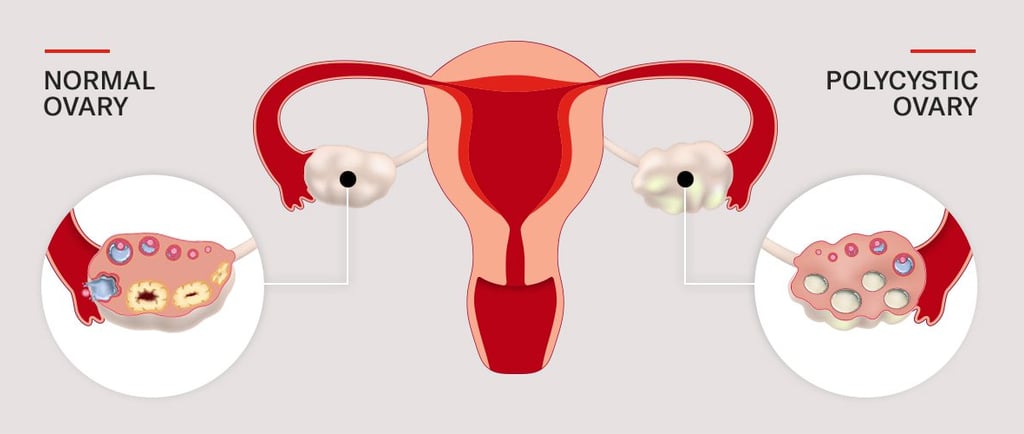Your blog postWhat is PCOS? A Clear Guide to Polycystic Ovary Syndrome
Blog post descWhat is PCOS? A Clear Guide to Polycystic Ovary Syndromeription.
Ashley Crowne
3/7/20223 min read


What is PCOS? A Clear Guide to Polycystic Ovary Syndrome
Polycystic Ovary Syndrome, or PCOS, is one of the most common endocrine conditions affecting women during their reproductive years. Despite how widespread it is, the disorder is still underdiagnosed and often misunderstood. PCOS can influence fertility, weight, skin, hair growth, and long-term health. If you’ve asked yourself, “What exactly is PCOS?”, then this article provides a clear breakdown of its causes, symptoms, risks, and available treatments.
What PCOS Means
PCOS happens when a hormonal imbalance interrupts normal ovarian activity. Women with PCOS typically produce higher-than-normal levels of androgens—male hormones that naturally exist in smaller amounts in women. This interferes with ovulation, making it harder for the ovaries to release eggs on schedule.
Sometimes the ovaries form multiple small sacs filled with fluid, called follicles or cysts. But having cysts doesn’t automatically mean PCOS, and some women with PCOS have no visible cysts at all. The diagnosis is based more on a set of symptoms and hormone changes than on cysts alone.
Typical Signs of PCOS
The condition can show up in many ways. The most common symptoms include:
Irregular or skipped periods – cycles may be unpredictable or prolonged.
Excess body and facial hair (hirsutism) – due to elevated androgen levels.
Persistent acne or oily skin – often resistant to standard skincare.
Hair thinning or shedding on the scalp – resembling male-pattern baldness.
Trouble managing weight – linked to insulin resistance in many patients.
Skin darkening – especially in folds around the neck, groin, or underarms.
Not every woman experiences the same combination of symptoms, which makes PCOS harder to identify.
What Causes PCOS?
Researchers haven’t pinpointed one single cause, but several factors contribute:
Family history – PCOS often runs in families, hinting at a genetic role.
Insulin resistance – High insulin can boost androgen levels, disrupting ovulation.
Hormone disruptions – Elevated LH (luteinizing hormone) and androgens interfere with ovarian function.
Chronic inflammation – Low-grade inflammation may trigger higher androgen output.
PCOS and Fertility
For women trying to conceive, PCOS can be a barrier since irregular ovulation reduces the chances of pregnancy. Still, PCOS does not mean permanent infertility. With the right combination of lifestyle adjustments, medication, and fertility treatments, many women successfully become pregnant.
Health Complications of PCOS
If left unmanaged, PCOS can have wider health effects, including:
Type 2 diabetes from ongoing insulin resistance.
Heart disease and hypertension due to metabolic changes.
Endometrial cancer from long-term irregular periods.
Sleep apnea in women who are overweight.
Mental health issues like anxiety, depression, or low self-esteem.
Diagnosis
Doctors often follow the Rotterdam Criteria, diagnosing PCOS if two of the following are present:
Irregular or missing ovulation.
Elevated androgen levels or related symptoms.
Enlarged ovaries with multiple small follicles on ultrasound.
Blood work may also check hormone levels, thyroid function, and cholesterol.
Managing PCOS
Although PCOS has no cure, treatments aim to reduce symptoms and lower risks. Approaches include:
Lifestyle improvements – weight management, regular workouts, and a nutrient-rich diet.
Medication –
Birth control pills help regulate cycles and reduce androgen activity.
Metformin enhances insulin sensitivity and may restore ovulation.
Anti-androgen drugs manage acne and unwanted hair.
Fertility options – Clomiphene or IVF for women who want children.
Cosmetic support – laser hair removal or dermatology care for acne.
Living with PCOS
PCOS is a lifelong condition that requires consistent monitoring. However, with proper diagnosis and tailored management, most women can live active, healthy lives. Emotional support, counseling, and patient education also play a critical role in handling the condition effectively.
Conclusion
So, what is PCOS? It is a complex hormonal disorder that can affect reproductive, metabolic, and emotional well-being. While there’s no permanent cure, treatment plans involving diet, exercise, and medical care allow women to control symptoms and protect long-term health.
If you suspect you have PCOS, the first step is to consult a healthcare professional. With timely diagnosis and a personalized care plan, women can improve their quality of life and achieve their health and fertility goals.
Excellence
Leading cosmetic procedures with global recognition and value.
We Are ISO 27001 Certified
Info@CosmedicExpress.com
© 2017 - 2025. All rights reserved.


